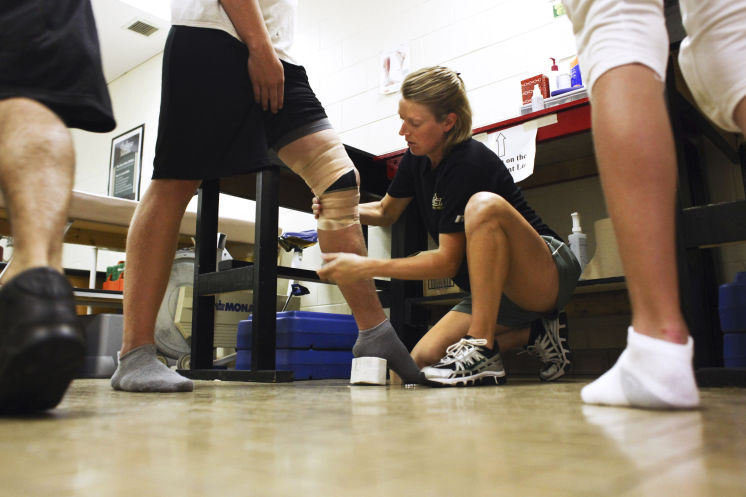
Article reposted from Tampa Bay Times
Author: Joey Knight
Here at the peak of our local storm season, an imperfect one is brewing along the landscape of grassroots sports.
Humidity and concussion awareness are rising, even as availability of qualified athletic trainers may be plummeting.
Among the casualties of the latest Florida budget was the $2.4 million annual funding for USF’s Sports Medicine and Athletic Related Trauma (SMART) Institute, which provides certified athletic trainers to Hillsborough County high schools.
Toss in a similar dilemma in Pasco County, where Florida Hospital informed the district it no longer can provide athletic trainers for all of its sporting events, and concern is segueing into worry.
TRAINERS NIXED: Cuts loom as school officials digest effects of state budget.
“The athletic trainers are the eyes on the field,” said Erik Nason, president of the Athletic Trainers’ Association of Florida. “They are monitoring everything that goes on, more than the coaches because the coaches are worried about the game.
“Any time a school or athletic event is without the (athletic trainer), there’s a risk. It’s as simple as that.”
Not quite so simple is the SMART Institute’s ultimate fate.
When funds were allocated in previous state budgets, the institute represented one body beneath the expansive umbrella of USF Health. This year, it stood alone as a budgetary line item.

Loren Elliott | Times
When athletes are on the field, it’s the trainers focused on possible injuries, not coaches who are focused on the game.
“The Legislature made a policy choice this session to go into a lot of university budgets and state college budgets all around the state and find old … projects like this one was, and pull them out for individual veto scrutiny,” said Mark Walsh, the USF System’s assistant vice-president for government relations.
And in Scott’s attempt to divert more money toward K-12 public schools, the SMART Institute became a line-item veto, Walsh said.
“The governor made this real clear: He didn’t say, ‘I don’t like this program, it should go away,’ ” Walsh said. “He said these are available funding sources now, and he has higher priorities.”

Douglas R. Clifford | Times (2009)
Part-time, much less full-time trainers, are hardly a given at high schools around the state.
USF already has requested the money be reinstated to next year’s budget. This year? Some tough choices could be forthcoming about which of its assortment of services — including athletic trainers — the SMART Institute may be able to offer.
“I think what we’re trying to do internally now is determine, after the veto, which services we can fund out of other sources, and which things need to be absorbed by other places, and which things may go entirely,” Walsh said. “I don’t know that any of those decisions have been completely determined at this point.”
If it no longer can provide athletic trainers at the prep level in Hillsborough, the county faces a predicament similar to its neighbor to the north.
Now that Pasco County’s contract with Florida Hospital has ended, Superintendent Kurt Browning recently insisted his district will fund athletic trainers, though it could add roughly $125,000 to its anticipated funding shortfall.
NECESSARY FUNDS: Pasco County high schools will have athletic trainers, superintendent says.
Hillsborough County athletic director Lanness Robinson couldn’t be reached. Meantime, the struggle to properly equip schools with trainers continues state-wide.
Nason said of the 663 Florida high schools his group has documented to have sports programs, only 219 have full-time athletic trainers and 211 have part-time trainers.
“In my mind, it should be a mandate that if a high school decides that they are going to have a sports program, there is an overhead responsibility of funding an athletic trainer full-time,” Nason said.
“Typically, we are the cherry on top when we provide safety and care to an athlete. But the athletic trainers also are the first thing that go if there’s a budget cut, and that’s incorrect.”